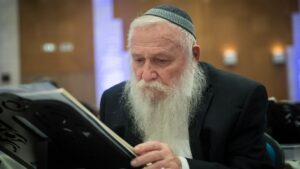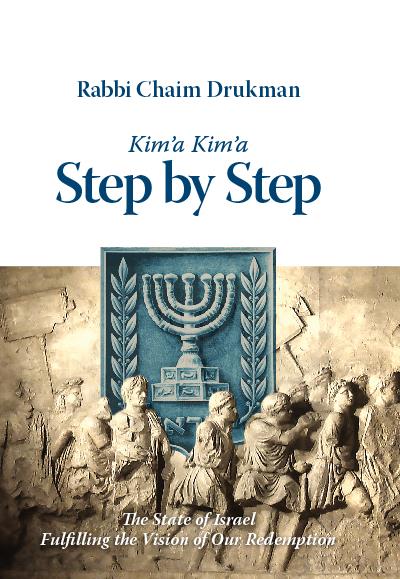DREAMERS! WAKE UP!

Rabbi Haim Drukman, of blessed memory, in his book on Israel’s Redemption, “Step-by-Step,” explains that there are two necessary aspects of t’shuva: the private repentance of the individual Jew and the communal t’shuva of the Jewish Nation. He quotes from the writings of Rabbi Yehuda Alkalai, author of the “Minchat Yehuda,” who made Aliyah from Serbia to Hevron in 1871. Rabbi Alkalai writes:
“Personal repentance means that a transgressor rectify his sins by following the rules of penitence as delineated by the Early Torah Authorities… Communal repentance means that all of the Jewish People must return to Hashem and to our Land, the heritage of our Forefathers, because ‘He who lives outside the Land of Israel is similar to one who has no G-d’ (Ketubot 110b), and ‘Jews who live outside of the Land of Israel are like idol worshippers (Avodah Zara 8a).”
Rabbi Drukman goes on to emphasize that the ingathering of the exiles in our time is an important aspect of the era of Mashiach, as stated by the Rambam in the Laws of Kings and Their Wars, Chapter 11:
“Whoever does not believe in the Mashiach or does not await his coming, denies not only [the statements of] the other prophets, but also those of] the Torah and of Moshe, our teacher, for the Torah attests to his coming, stating: ‘And the L‑rd your G‑d will bring back your captivity and have compassion upon you. He will return and gather you [from among all the nations]…. even if your dispersed ones are in the furthest reaches of the heavens, from there will G-d gather you in…. G‑d will bring you to the Land of Israel.’”
Furthermore, Rabbi Druckman explains that Medinat Yisrael (thye State of Israel) is the vessel which Hashem has established to bring the Redemption by gradual natural means as set forth in the Jerusalem Talmud:
“Rabbi Hiyah Rabbah and Rabbi Shimon Ben Halafta were walking in the Arbel Valley at the break of morning before the light of day. They watched the dawn as the light began to shine. Rabbi Hiyah, the great one in wisdom, said to Rabbi Halafta, ‘Rabbi, so too unfolds the Redemption of Israel – in the beginning, little by little. And the more it progresses, it increases and grows’” (Berachot, 1:1).
Rabbi Drukman questions: “After all that has happened to the Jewish People in our time, how is it possible that there are Jews still living in the Diaspora? Why are not racing back home to Israel? Religious Jews daven three times daily to return to Zion, and today there are airplanes to bring them here and houses already built and waiting, yet many remain in foreign lands when the ingathering of the exiles envisioned by our Prophets has unfolded before our eyes.”
DREAMERS! WAKE UP!
Rabbi Drukman has a remarkable insight on the verse in Tehillim, “When the L-rd brought back the exiles of Zion we were like dreamers” (Tehillim, 126:1). To remind the reader, this verse is found in the Psalm we read before Birchat HaMazone on Shabbat. The words of King David express our longing for Redemption from foreign lands and teach that true joy can only be obtained with our return to Israel.
In his book, “Step-By-Step” on the Redemption of Israel, Rabbi Drukman devotes a chapter to explain the reference to dreamers in the famous Psalm. Interestingly, he calls the chapter “Wake Up from Your Dream!” Before presenting his own explanation, Rabbi Drukman summarizes the three main understandings handed down by our Sages. The Ibn Ezra states that when the scattered and outcast exiles return to Israel they will be so astonished by the wondrous event that it will seem to them as if they are dreaming. The Torah commentator, the Radak, quoting his father Rabbi Yosef Kimchi, states that when the redeemed Jews in Israel look back at the exile it will seem to them like a passing nightmare compared to the great joy they now experience as free Jews in the Jewish Homeland. According to the Meiri, the use of the expression “dreamers” describes how the exiled Jews throughout the centuries in alien Gentile countries always dreamed of Redemption with the return to Zion.
In light of our own experience in our time, Rabbi Drukman offers a fourth explanation. To heighten our understanding he employs a metaphor of a classroom where some students sit daydreaming, their eyes open but their minds far away, dreaming of other matters, totally disconnected from the lesson in the classroom. “The phrase ‘We were like dreamers’ can be similar understood,” he writes. “Instead of seeing the glorious events in which we had the opportunity and privilege of participating, instead of seeing their magnitude, many of us remained mired down with minor problems, alien aspirations and material concerns, detached from the significance of the miraculous events unfolding in front of our eyes. We simply did not perceive the miracle of the creation of the State of Israel.”
“After nearly 2000 years of exile, pursued all over the world and suffering untold tragedies, Hashem brought back the captives of Zion. And how did we react? We were like dreamers. We remained involved in our own little worlds. We did not internalize what was happening and we remained disconnected from the momentous events. Tragically, when we were finally privileged to play a role in the establishment of a Jewish State with a Jewish government and Jewish army, we were caught daydreaming, just like a daydreaming student in class who doesn’t hear the teacher.”






